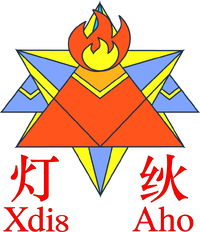Han-reform
Han-reform (hàngǎi 汉改), named vaguely on purpose, is a set of movements since late 1990s concerning Chinese language, its script, or both, sharing some similarity with English spelling reform. These proposals are often deemed eccentric due to their impractical features. Shidinn and Zhou script are two examples of Han-reform.
Difference from serious script reform
Many debates related to the national language and script problem occurred in China during the 20th century. Some scientific consensus was reached, such as vernacular (‘living’) language-based writing, incorporation of political and technical loanwords, etc. This concensus implied that script reform should be done through combined efforts instead of being invented in a garage, which further boosted the discussion and eventually resulted in Putonghua, Pinyin and Simplified Chinese characters.
By the 1990s, the focus on script reform decreased, largely due to changes in social ideology but also because of standardization of Chinese and the widespread use of computers. People no longer sought after the mindset of script reform and some ‘new’ passionate individuals emerged as Han-reformists who advocated various strange inventions.
Some early opinions were highly unrealistic as well, such as the suggestion by some Chinese students in Paris in 1908 that Chinese people should speak Esperanto instead of Chinese[1]. However, these opinions were then merely marginalised among the active discussion. Only when the public attention decreased have the weird ideas survived to form the Han-reform phenomenon. Behaviour of Han-reform resembles English spelling reform; the difference is that Han-reform is growing up under the dusk of serious script reform.
Types
Though Han-reformists often blur the boundary between language and script (hence the name, where hàn vaguely refers to Chinese language Hànyǔ or Chinese character Hànzì), script still draws more attention.
Notes
- ↑ The remark was refuted by Zhāng Tàiyán in his essay Refutal for China’s adoption of Esperanto (駁中國用萬國新語說). Zhāng pointed out that the advocators simply think that ideographic writing are for uncivilized people and phonetic writing are for civilized people.
See also
In other languages
- 本页中文版见汉改。
